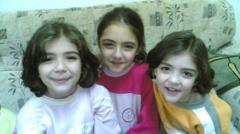Families in Syria are enduring an agonizing strife as they seek information about loved ones detained during the harsh years of conflict. As the rebel forces advanced, thousands of political prisoners were reportedly released from government-controlled jails, but many families remain without concrete answers regarding the fate of their missing relatives.
Among those desperately searching for information is Naila Al-Abassi, whose sister Rania was arrested in March 2013, along with Rania’s six children, and her husband, Abdul Rahman Yasin. From abroad, Naila expresses her family's unwavering hope and dread, stating, "Since the fall of the regime, we really hope we can see Rania and her kids again."
The Al-Abassi children were aged between two and 14 at the time of their arrest. Despite recent releases, the family has yet to receive news about their whereabouts. The only sign was from a former inmate, who stated she heard children’s voices two weeks after the initial arrest, raising fears of their suffering in a notorious prison in Damascus. "We are watching the news and seeing people released from the prisons... It is unbearable," lamented Naila, who feels as if their suffering has never faded.
Another heart-wrenching story is that of Majd Kamalmaz, a US psychotherapist who vanished in 2017 while visiting family in Syria. His daughter, Maryam, holds onto the hope that her father might still be alive, despite bleak reports from US intelligence suggesting he had died in custody. "The FBI told us he was dead, but they did not have a body or any concrete information,” Maryam noted.
Maryam seeks closure, whether through finding her father alive or discovering his remains. She has been actively searching hospitals and prisons, clinging to any glimmer of hope upon seeing other former prisoners' stories. "I keep looking at the pictures and videos of people coming out of the Saydnaya prison... maybe I will see him there," she shared.
The plight of families with missing relatives underscores the complexity of seeking justice and closure amid the legacy of a protracted civil war. As communities grapple with fluctuating hopes and despair, the narratives of those like Rania and Majd remind the world of the enduring human costs of conflict—forever etched in the memories of their loved ones.


















